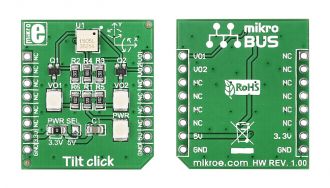
We strongly encourage users to use Package manager for sharing their code on Libstock website, because it boosts your efficiency and leaves the end user with no room for error. [more info]

Rating:
Author: MIKROE
Last Updated: 2019-03-12
Package Version: 1.0.0.1
mikroSDK Library: 1.0.0.0
Category: Motion
Downloaded: 7196 times
Followed by: 4 users
License: MIT license
Tilt click carries RPI-1035, a 4-directional optical tilt sensor. This type of sensor provides positional feedback for left, right, up or down movements. Tilt click communicates with the target board microcontroller through mikroBUS PWM and INT lines, used here for vout1 and vout2 outputs from the sensor.
Do you want to subscribe in order to receive notifications regarding "Tilt click" changes.
Do you want to unsubscribe in order to stop receiving notifications regarding "Tilt click" changes.
Do you want to report abuse regarding "Tilt click".

Library Description
The library covers all the necessary functions to control Tilt Click board. Tilt click communicates with the target board via GPIO protocol, PWM and INT pins. This library contains drivers to detect tilt movement's direction: left, right, up or down.
Key functions:
Examples description
The application is composed of three sections:
void applicationTask()
{
tiltDirection = tilt_direction();
if ( tiltDirectionOld != tiltDirection )
{
if ( tiltDirection == _TILT_LEFT_DETECTION )
mikrobus_logWrite( " LEFT ", _LOG_LINE );
if ( tiltDirection == _TILT_RIGHT_DETECTION )
mikrobus_logWrite( " RIGHT ", _LOG_LINE );
if ( tiltDirection == _TILT_UP_DETECTION )
mikrobus_logWrite( " UP ", _LOG_LINE );
if ( tiltDirection == _TILT_DOWN_DETECTION )
mikrobus_logWrite( " DOWN ", _LOG_LINE );
tiltDirectionOld = tiltDirection;
mikrobus_logWrite( "-------------", _LOG_LINE );
}
}
Other mikroE Libraries used in the example:
GPIOUARTAdditional notes and informations
Depending on the development board you are using, you may need USB UART click, USB UART 2 click or RS232 click to connect to your PC, for development systems with no UART to USB interface available on the board. The terminal available in all MikroElektronika compilers, or any other terminal application of your choice, can be used to read the message